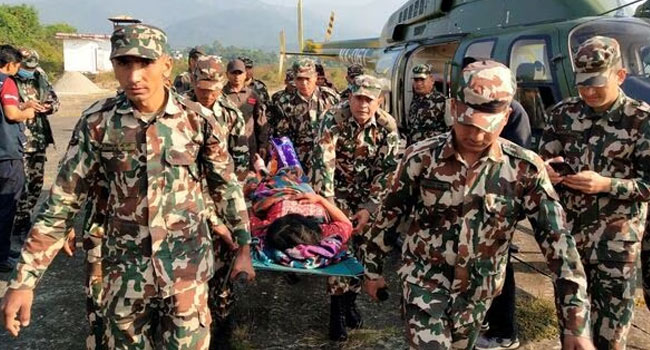At least 132 people were killed in an overnight earthquake that struck a remote pocket of Nepal, officials said Saturday, as security forces rushed to assist with rescue efforts.
The 5.6-magnitude quake hit the far west of the Himalayan country late Friday and was measured by the US Geological Survey at just 18 kilometres (11 miles) deep.
Videos and photos posted on social media showed locals digging through rubble in the dark to pull survivors from the wreckage of collapsed homes and buildings.
Mud houses were flattened or damaged as survivors crouched outside for safety, the sirens of emergency vehicles wailing.
The quake was felt as far away as India’s capital New Delhi, nearly 500 kilometres from the epicentre, 42 kilometres south of Jumla.
“Ninety-two people died in Jajarkot and 40 in Rukum,” home ministry spokesman Narayan Prasad Bhattarai told AFP, referring to the two districts hit worst by the quake.
National police spokesman Kuber Kathayat said authorities had tallied more than 100 others injured across both districts.
Security forces have been deployed to assist with search and rescue operations, Karnali Province police spokesman Gopal Chandra Bhattarai told AFP.
“The remoteness of the districts makes it difficult for information to get through,” he added.
“Some roads had been blocked by damage, but we are trying to reach the area through alternate routes.”
The district hospital was packed with residents bringing in injured victims.
‘Human and physical damages’
Nepalese Prime Minister Pushpa Kamal Dahal arrived at the site of the quake on Saturday after expressing his “deep sorrow over the human and physical damage”.
“The government is serious about providing relief to victims and treating the injured,” he added.
In neighbouring India, Prime Minister Narendra Modi said he was “deeply saddened” by the loss of lives.
“India stands in solidarity with the people of Nepal and is ready to extend all possible assistance,” he added.
Nepal lies on a major geological faultline where the Indian tectonic plate pushes up into the Eurasian plate, forming the Himalayas, and earthquakes are a regular occurrence.
Nearly 9,000 people died and more than 22,000 were injured in 2015 when a 7.8-magnitude quake struck Nepal, destroying more than half a million homes.
It damaged or destroyed nearly 8,000 schools, leaving almost one million children without classrooms.
Hundreds of monuments and royal palaces—including the Kathmandu Valley’s UNESCO World Heritage sites — that had drawn visitors from around the world were destroyed, in a major blow to tourism.
Six people died in November last year when a 5.6-magnitude earthquake struck Doti district, near Jajarkot.
Indian social media users reported feeling Friday’s quake in the northern cities of Lucknow and Patna.
It was followed several hours later by an aftershock in the same area with a 4.0 magnitude, USGS said.






























